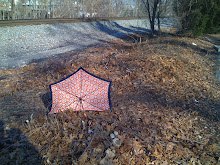Good morning from San Francisco! Yesterday was the first day of the Game Developers Conference and it was a pretty packed day. I am here to attend the Serious Game and Casual Game summits, with the occasional wandering over to see what the independent game producers are up to. These summits consist of presentations, panel discussions and workshops on a number of issues around game design over the course of two days. The conference itself lasts five days, but the last three are really about games for entertainment that's when companies like EA and Nintendo pull out their big new games for everyone to preview. I'll stick around for the first day of that part of conference because that's when there is some interesting overlap between the two sides of the business.
Much of the hype this year has been about iPhone and other smart phone games, as well as games for Facebook. I am interested in the growing number of platforms for gaming, but as an artist the small screen size is a major drag. This is also a year when everyone is talking about government RFPs (requests for proposals) these are typically issued from a government agency like the National Endowment for the Humanities or the Department of Education or more often the U.S. military. Such government contracts are a growing part of the serious game industry as these different agencies start to see the potential for gaming as a training or education tool. These contracts can be very lucrative and small companies are often encouraged to apply because of rules that support small business. I'll return to this topic later when I discuss the session I went to on RFP's.
Anyway, the morning began with a short presentation on a social game project known as Akoha which bills itself as the world's first social reality game where you earn points by playing real world missions with your friends. The whole point is basically a pay it forward concept, you get cards that have points on them for performing acts of kindness, in using your card you receive the points and then pass the card on to the next person who is supposed to do the same thing. Everytime your card is used after that gives you more points. The presentation raised some interesting questions about social gaming and acts of kindness (is it still a good deed if you are doing it for the points?). What I was interested in was how with these cards and other merchandise the company was looking for a real world product to sell that would generate income and support the online game. This is a concept really developed successfully by Webkinz and I'd been wondering why it hasn't been done more.
The second session in the morning was a workshop on teaching game design in the classroom without using a computer. For this workshop we were put in teams and assigned some group projects to complete. It ended up being pretty interesting and could prove useful in a course on interactive art/media as well as game design.
In the afternoon I attended a presentation by Katherine Isbister on the topic of designing more compelling avatars for your game by considering the psychology of the player. Katherine suggested that as designers we think of the avatar as a bionic problem solving suit, it represents and enhances the image of the player to others and themselves. She discussed four levels of psychology to consider in developing the avatar: visceral, cognitive, social, and fantasy. She gave some examples of successful character designs from Bear.com to Little Big Planet and City of Heroes. The big take away for me was to consider ease of use in personalizing an avatar vs. a more complex interface such as in Second Life that requires much more buy-in from the player. There's more, but I'll have to write more after I reflect a bit.
The last session was on the RFP thing I mentioned earlier and here I'll just paste my notes because I need to run to Day 2's events.
Legal Issues
1. Who owns the intellectual Property?
2. Who has rights to the source code?
Marketplace Issues
If you are a sponsor where do you post opps?
See sites
Serious Gaming
Building Better RFPs
3 q’s
What are we trying to teach the player?
How will we know when the player has learned it?
Who needs to know if they have learned it?
And a list of sites for funding:
Sites
www.fedbizopps.gov
www.grants.gov
http://ies.ed.gov/funding
http://www.nsf.gov/funding/
http://www.nsf.gov/funding/pgm_summ.jsp?pims_id=5361
http:///digitallearning.macfound.org
http://www.kauffman.org/
http://www.rwjf.org
http://www.cpb.org/grants
Chronicle of Philanthropy
Okay, well, more later.
The Game of Life
-
Life is a game. You need to get the right players involved. Move the pieces
to where they might fit the best. Where is my next move?
15 years ago












No comments:
Post a Comment